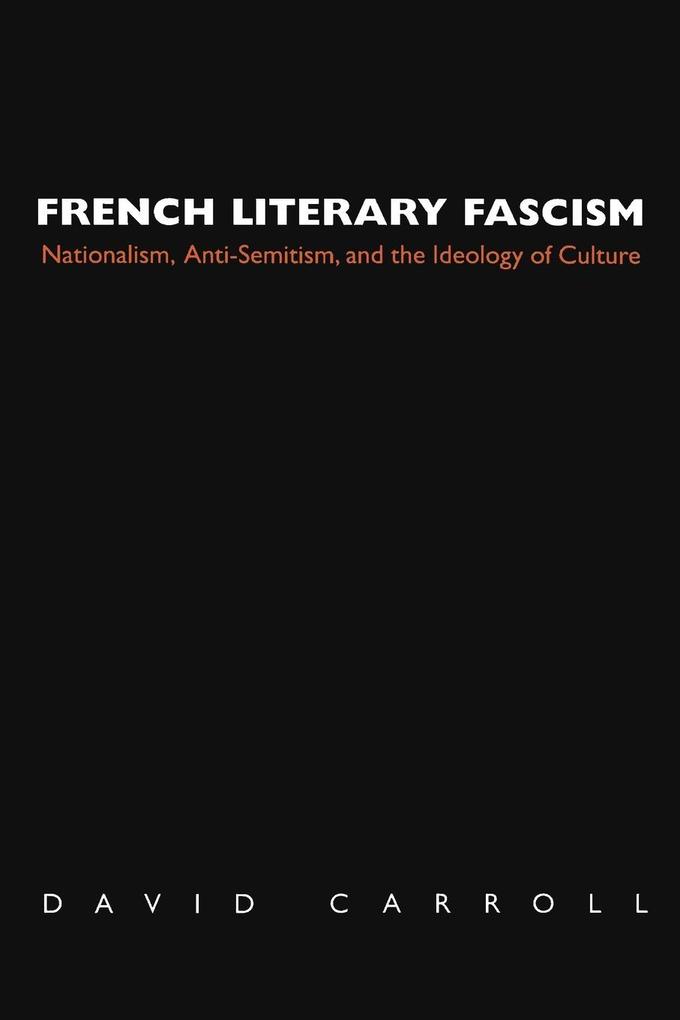
Zustellung: Do, 17.07. - Mo, 21.07.
Versand in 5 Tagen
VersandkostenfreiThis is the first book to provide a sustained critical analysis of the literary-aesthetic dimension of French fascism--the peculiarly French form of what Walter Benjamin called the fascist "aestheticizing of politics." Focusing first on three important extremist nationalist writers at the turn of the century and then on five of the most visible fascist intellectuals in France in the 1930s, David Carroll shows how both traditional and modern concepts of art figure in the elaboration of fascist ideology--and in the presentation of fascism as an art of the political.
Carroll is concerned with the internal relations of fascism and literature--how literary fascists conceived of politics as a technique for fashioning a unified people and transforming the disparate elements of society into an organic, totalized work of art. He explores the logic of such aestheticizing, as well as the assumptions about art, literature, and culture at the basis of both the aesthetics and politics of French literary fascists. His book reveals how not only classical humanism but also modern aesthetics that defend the autonomy and integrity of literature became models for xenophobic forms of nationalism and extreme "cultural" forms of anti-Semitism. A cogent analysis of the ideological function of literature and culture in fascism, this work helps us see the ramifications of thinking of literature or art as the truth or essence of politics.
Carroll is concerned with the internal relations of fascism and literature--how literary fascists conceived of politics as a technique for fashioning a unified people and transforming the disparate elements of society into an organic, totalized work of art. He explores the logic of such aestheticizing, as well as the assumptions about art, literature, and culture at the basis of both the aesthetics and politics of French literary fascists. His book reveals how not only classical humanism but also modern aesthetics that defend the autonomy and integrity of literature became models for xenophobic forms of nationalism and extreme "cultural" forms of anti-Semitism. A cogent analysis of the ideological function of literature and culture in fascism, this work helps us see the ramifications of thinking of literature or art as the truth or essence of politics.
Inhaltsverzeichnis
Acknowledgments Pt. 1The Fathers of French Literary Fascism 1The Use and Abuse of Culture: Maurice Barres and the Ideology of the Collective Subject The Cult of the Self Cultural and Racial Typologies The Aesthetics of the Collective Subject 2The Beautiful Community: The Fascist Legacy of Charles Peguy Aesthetic Socialism Antimodernism and the Spiritualization of History Nation, Culture, Race 3The Nation as Artwork: Charles Maurras and the Classical Origins of French Literary Fascism Antiromantic Organicism Integral Nationalism, Anti-Semitism, and the Aesthetic Power of the Monarch Pt. 2Literary Fascists 4Fascism as Aesthetic Experience: Robert Brasillach and the Politics of Literature Nationalism, Fascism, and the Defense of Literature Fascist Joy and the Aestheticizing of Experience 5The Fascist Imagined Community: The Myths of Europe and Totalitarian Man in Drieu la Rochelle The Modernist Political Imagination The Ideal of Total Art The Fascist Imagination and the Myth of Europe Aesthetic Ideals and Collaborationist Politics Apocalyptic Fictions 6Literary Fascism and the Problem of Gender: The Aesthetics of the Body in Drieu la Rochelle The Gender(s) of Fascism: Sartre, Adorno, Theweleit The Fascist Aesthetics of the Body The Trouble with Gender and the Ambivalence of Desire 7Literary Anti-Semitism: The Poetics of Race in Drumont and Celine The Aesthetic Totalization of the Other Style and Race The Politics of Language and the Poetics of Race 8The Art of Anti-Semitic Rage: Lucien Rebatet's Aesthetics of Violence Aesthetic Sensibility and Anti-Semitism The Aesthetic Final Solution 9A Literary Fascism beyond Fascism: Thierry Maulnier and the Ideology of Culture Classicism, Humanism, Fascism Tragedy, Violence, and the National Revolution The Spiritual Revolution and the Ideal of Culture Afterword: Literary Fascism and the Case of Paul de Man Notes to the Chapters Index
Produktdetails
Erscheinungsdatum
21. Juli 1998
Sprache
englisch
Seitenanzahl
310
Autor/Autorin
David Carroll
Verlag/Hersteller
Produktart
kartoniert
Gewicht
506 g
Größe (L/B/H)
229/152/18 mm
ISBN
9780691058467
Entdecken Sie mehr
Pressestimmen
"What interests [Carroll] is fascist ideology and fascist aesthetics, and the relationship between literature and political extremism in general and anti-Semitism in particular. Where some champions of these writers have attempted to separate their writing from their politics, Carroll argues powerfully that it was precisely their faith in art and literature which led them to identify with fascism."--James F. McMillan, The Times Literary Supplement "In French Literary Fascism, Carroll dissects with great care the nature of fascist thought in French literature... His commentaries are meticulous, documented, intelligent."--Robert Zaretsky, The Virginia Quarterly Review "A crisp and compelling narrative... [This] is a book that all scholars of French fascism will have to take seriously."--William D. Irvine, American Historical Review "That some of the heirs of Voltaire espoused Fascism is one of the great tragedies of French literature. Caroll ... demonstrates in depth how these brilliant, intelligent, and frequently creative writers, after only the slightest shift of viewpoint, turned nationalist politics into a violent, aggressive, antisocial, terrifying absolute, and vicious alternative to democracy. This is the definitive work on a tragic subject."--Choice "What stands out is the author's critical intelligence and principled fairness. Although Carroll clearly detests the writings of his subjects, he never loses sight of his project, nor does he diminish the impact of his findings by veering into polemic. Readers interested in the always contemporary debate surrounding anti-hate legislation and freedom of expression will find French Literary Fascism a fascinating read."--Erna Paris, Toronto Globe and Mail
Bewertungen
0 Bewertungen
Es wurden noch keine Bewertungen abgegeben. Schreiben Sie die erste Bewertung zu "French Literary Fascism" und helfen Sie damit anderen bei der Kaufentscheidung.







